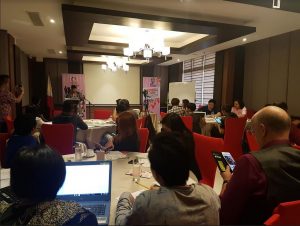
Department of Social Welfare and Development (DSWD) Judy M. Taguiwalo this morning delivered a keynote speech at the Regional Workshop to Promote Family Acceptance of Lesbian, Gay, Bisexual, Transgender, Intersex and Queer (LGBTIQ) Persons in the ASEAN activity led by the ASEAN SOGIE Caucus (ASC).
The ASC is a regional coalition working for the protection and promotion of the rights of lesbian, gay, bisexual, transgender, intersex and queer (LGBTIQ) persons in the Southeast Asian region. Its work entails advocacy to ensure that SOGIE related concerns are reflected in domestic and regional level policies. It also works with various groups to build and strengthen a LGBTIQ movement in the ASEAN region.
In her speech, Sec. Taguiwalo reiterated her full support for LGBTIQ rights and said that much still has to be done to stop discrimination against LGBTIQ persons and increase not only tolerance, but understanding and acceptance of the same in Philippine society.
“At face value, the Philippines looks to be one of the more “liberal” ASEAN countries when it comes to the LGBT rights and advocacies. Homosexuality is not criminalized, and anti-discrimination ordinances have been passed in big cities such as Quezon City, Cebu City and Davao City, in recent years. There have also been international researches that point out how as much as 70 percent of Filipinos think that homosexuality should be “accepted by society,”, and that the Philippines is the most “tolerant” nation surveyed in the Asia-Pacific region after Australia,” she said.
“While these are positive developments, it still cannot be ignored, however, that efforts to push forward a national law on the same continue to be blocked mainly by religious groups and formations that oppose civil rights legislation for the LGBT community. Much has to be done to promote understanding and acceptance of LGBT rights,” she said.
Sec. Taguiwalo told the audience during the workshop that educating Filipino society on LGBTIQ rights should start at home.
“When people we love and care about tell us that they are lesbian, gay, bisexual, how we react to their declaration and admission has a significant impact on how they will accept themselves and share themselves with others. “I am gay” are three simple words, but how we – as friends, parents, relatives, colleagues receive these words are not automatically a simple matter. Different people react differently – there are for instance, parents who are rendered speechless or become upset; there are others who are angered and disown their own flesh and blood.
Let it be said and let it be known that friends, relatives, parents, colleagues of LGBTIQ must realize that how they accept the admission of “I am gay/lesbian/bisexual/queer” matters. Focusing on the families of LGBTIQ, how families respond when their loved ones come out during adolescence can have an important impact on the young person’s health and well-being. I feel that it is not up for debate that LGBTIQ youth whose families support them are healthier and happier compared to youth whose families reject them. This, I feel, also applies for adults who have kept their SOGIE hidden in the closet and then finally came out,” she said.
In closing, Sec. Taguiwalo expressed her support anew for LGBTIQ rights and welfare, and also made an appeal:
“Let us persevere in our efforts to promote issues of LGBTIQ rights as a matter of human rights. As we also campaign for issues of social justice in our respective countries and societies, let us remember that we cannot separate our views about LGBTIQs from our advocacies for human rights. Many LGBTIQ advocacy groups and activists also actively campaign and speak out in defense of the rights of marginalized sectors such as those of workers, farmers, urban and rural poor, and this is because we know that there are a significant LGBTIQ individuals among these sectors, and because to unite with these sectors in their respective struggles for economic, political, civil, and human rights is what fighting for social justice is all about,” she said. #


